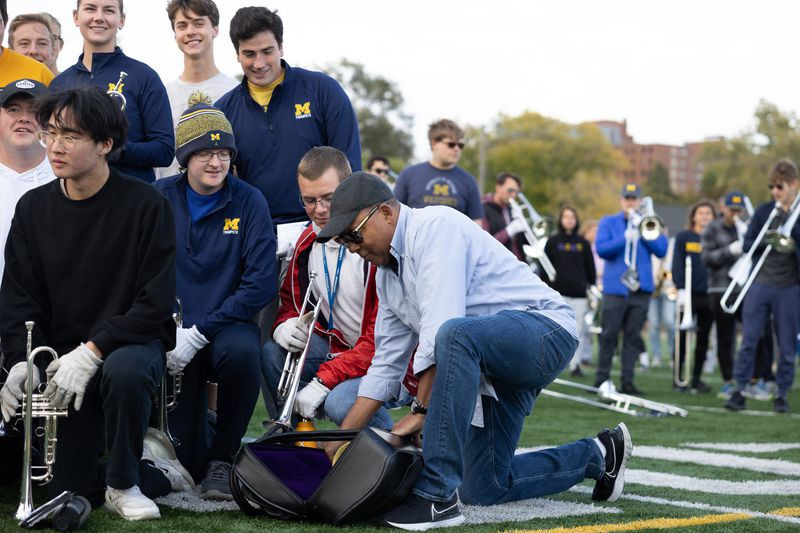Wynton Marsalis to help Michigan marching band ring in 125th Anniversary at halftime

Michigan marching band welcomes Wynton Marsalis (photo: Ryan Sun)
ANN ARBOR, MI – Jazz and the University of Michigan Marching Band are around the same age.
Jazz historians say that while the genre evolved over the 19th century, a commonly accepted origin was in New Orleans around 1895, according to NewOrleans.com.
A year after that, Harry dePont gathered gathered around 30 musicians on UM’s campus in Ann Arbor to establish a student-run marching band, according to the band’s website. In the fall of 1897, band leader Lewellyn Renwick and his musicians accompanied the football team to Detroit to perform during a 14-0 victory by Michigan over Minnesota.
This fall marks the band’s 125th anniversary, and during halftime at this weekend’s football game, its history will merge with the legacy of American jazz in a show with one of the genre’s living icons.
Wynton Marsalis, a 9-time Grammy Award winner and the first jazz musician to win a Pulitzer Prize for composition — along with his Jazz at Lincoln Center Orchestra — will collaborate with the marching band at halftime of Michigan’s home football game Saturday against Penn State.
Marsalis and the orchestra are wrapping up a weeklong residency at UM with the University Musical Society (UMS). Residency stops this week included the Detroit School of Arts, the Milan Correctional Facility and a Friday performance at UM’s Hill Auditorium.
The band and Marsalis expect to make sweet music at Michigan Stadium on Saturday, said band director John Pasquale.
“The jazz idiom fits really well with what we do,” he said. “It was a bit of a no brainer for us in terms of coming together musically. It’s a fantastic symbiotic relationship.”
Earlier this year, UMS approached Pasquale with the idea of collaborating with Marsalis during his residency, an opportunity Pasquale “of course” accepted, he said. That led his team to start arranging music with Chris Crenshaw, a trombone player and arranger for the orchestra alongside Marsalis.
This led to a set list of “Feeling Good” by Nina Simone, “Sing, Sing, Sing” by Louis Prima, and then a New Orleans-style funeral march finale with the songs “Have Thine Own Way, Lord” and “When the Saints Go Marching In.”
The songs chosen have a way of telling the audience about the history of American jazz, Crenshaw said. He added the way he learned jazz history was through late New York radio host Phil Schaap and big radio concerts with artists such as Benny Goodman.
Crenshaw said he hopes Saturday’s halftime show has a similar influence on people in the crowd.
“That’s what it really is all about…bringing people together,” he said. “That’s included in the fabric of that history, and it’s encoded in the fabric of this music.”
125 years of marching and music
Every halftime show this football season has tried to honor the UM marching band’s 125-year history, Pasquale said. One of this year’s highlights included a show called “About Damn Time” to honor the integration of women into the band 50 years ago.
“The band is whole because of the contributions of these women,” he said, pointing out former band member Lynn Hanson as one of the original women present at the show.
“It’s about a 50-50 split now (between men and women),” he said. “Just to see the contribution of women and those that identify as such in the in the program, I think that is just wonderful.”
That integration occurred in 1972. The current “Voice of the Michigan Band” Carl Grapentine has been the band’s announcer since two years before that (as well as Michigan Stadium’s Public Address announcer since 2006). This perhaps makes him the elder statesmen of the band, as the man who hired him was none other than the longest-serving band director and namesake of the band’s building William Revelli.
From 1935-1971, Revelli took the band’s music and choreography to a new level through “sheer force of will,” Grapentine said.
“He was he was really instrumental in promoting and developing and growing college band programs,” he said, adding that University of Illinois’ band was an influence.
Revelli broke the mold on expanding the band’s playlist beyond standard “John Phillips Soussa-esque” marches, Grapentine said. Current staples of the marching band’s playlist include “Temptation” by Perry Como and “Hawaiian War Chant,” two songs incorporated in the 1950s under Revelli’s watch.
Right before Revelli took over in the 1930s, former band director Nicholas Falcone recruited the university ROTC to improve the band’s marching precision. Revelli further emphasized the “military precision” in the years after World War II, Grapentine said.
For Grapentine, a retired morning host of one of the country’s leading classical music stations in Chicago, he is excited to hear older jazz music this weekend that would have fit nicely in the Revelli era.
“Jazz just fits the sound of the band,” he said.
After nine months of planning the collaboration with Marsalis, Pasquale is excited to finally have the band perform it. For Crenshaw, he hopes the crowd of 100,000-plus “learns something and has a good time learning.”
“We want somebody sitting in the stands and getting inspired,” Crenshaw said. “This is a celebration of part of your history, partly the 125th (anniversary) but also this is America’s music.”
“Jazz is American music, so be proud of it.”
by Samuel Dodge
Source: MLIVE

